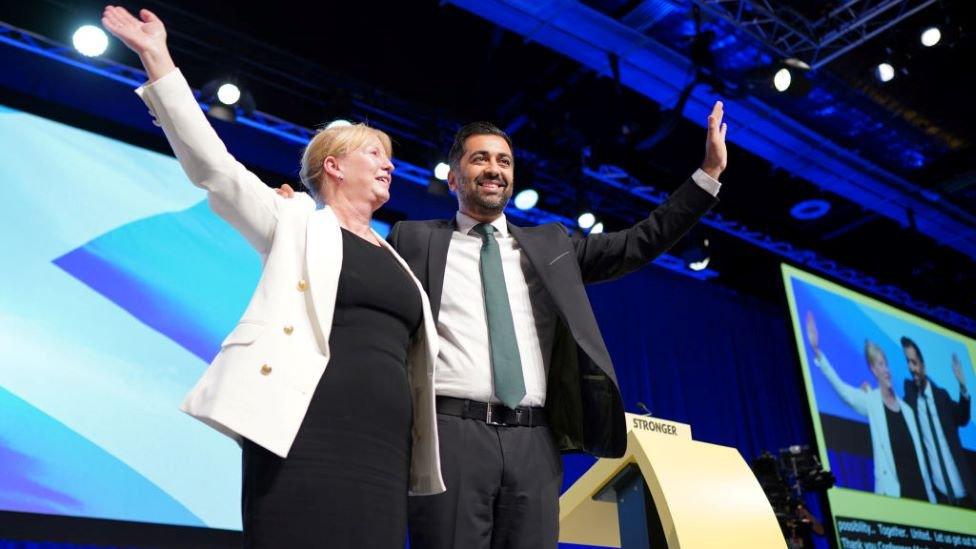Inverclyde is second council to defy tax freeze
- Published

First Minister Humza Yousaf announced the freeze at his party conference in 2023
A second council is to put up the council tax against the wishes of the Scottish government.
Councillors in Inverclyde have backed an 8.2% rise.
Last week Argyll and Bute voted to put bills up by 10%.
The First Minister Humza Yousaf says council tax rises are unjustifiable.
Inverclyde Council argues the rise means it will not need to cut jobs and can minimise cuts to services.
Labour runs the council but does not have an overall majority. The rise was opposed by the SNP, the second largest group.
The rise will mean Band D bills going up by £117 to £1547 a year - a rise of £2.25 a week.
However, most households in Inverclyde live in properties in lower bands.
Almost half are in Band A where the rise will be the equivalent of £1.50 a week.
It was also agreed that the council will raise council tax by 6% in the year 2025/26.
Councillor Stephen McCabe, leader of Inverclyde Council, said it had been the most difficult budget he had been involved in during 17 years with the council.
"Council Tax has risen by an average of 1.1% in Inverclyde over the last 16 years, well below the average rate of inflation, which is a big reason why the council is facing a huge budget deficit. This cannot continue. Councils are at breaking point," he said.
"By increasing council tax and utilising reserves we have kept service cuts to a minimum.
"An 8.2% increase means the average council tax rise over the last 17 years is 1.5%, still significantly below the rate of inflation.
"We are today exercising our right as a council to set our own rate of council tax and to decline the Scottish government offer to freeze the rate for next year," he added.
Cllr Elizabeth Robertson, leader of the SNP group on Inverclyde Council, said she was disappointed with the decision.
"We had two budgets before us this afternoon when we went into the chamber. One which accepted around about £2.8 million from the Scottish government and one which asked for that £2.8m to be taken directly from the pockets of the people of Inverclyde and I believe we made the wrong choice this afternoon," she said.
"We know there are still people who do pay a proportion of their council tax who are struggling to put food on the table for their families. We've now gone from an authority that has an average council tax level at band D to being the second highest in the entirety of Scotland.
"The stark fact remains, our Labour administration today put up the council tax of the people of Inverclyde by 8.2% when they did not have to do so. The money was available to do exactly the same with their budget from the Scottish government," she added.
Some 2,300 of Inverclyde's 40,000 households are exempt from council tax. A further 9,000 who receive council tax reduction will also not need to pay any more.


Two councils have now put up the council tax against the Scottish government's wishes.
The majority of councils have now agreed to freeze the tax although some say they felt they had no choice.
The council tax freeze was unexpectedly announced by the First Minister at the SNP conference in October.
The row which followed has strained the relationship between councils and the Scottish government.
Any councils which put up the council tax will lose some of their government funding. This means the rise has to do two things: balance out lost government funding and then raise additional revenue.
The big unknown is how local voters in Inverclyde and Argyll and Bute may respond.
Will people be prepared to pay more council tax to avoid, or at least minimise, cuts?
Or might they ask why their bills are going up when they are staying frozen in most of Scotland?
